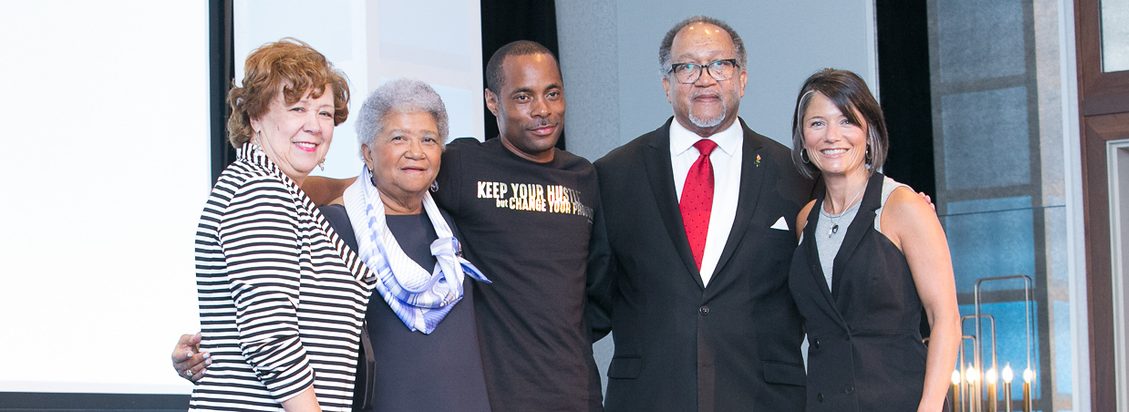FORMER INMATE, NOW CRIMINAL JUSTICE ADVOCATE OFFERS SOLUTIONS DURING NNPA CONVENTION

By Daja E. Henry, Ila Wilborn and Natrawn Maxwell #TeamAuthentic | New Journal & Guide
On Friday, June 29, Lamont Carey addressed members of the National Newspaper Publishers Association (NNPA) at their annual convention in a presentation entitled Criminal Justice Reform and the African American Community.
Carey is a motivational speaker, spoken word artist and entrepreneur. After his release from prison in 2002, he founded CONTACT VISITS, a nonprofit organization dedicated to reducing recidivism. According to the National Institute of Justice, within five years of release, 76.6 percent of released prisoners were rearrested.
To combat this epidemic, he set a goal to help young people who are starting to get involved in crime, people currently in prison, and people freshly released from prison to overcome mental barriers by changing cognitive behaviors.
“Crime is a subculture,” he said. “There are rules and philosophies that you learn to live by that continually produce and protect bad behavior.” In changing the thought process around their actions, Carey helps people to create or design a personalized pathway to their own success. Based on this philosophy, Carey created a curriculum that has been implemented in communities and jails nationwide.
He reinforces this curriculum in his book, “Dead Before 18‒Saving Our Boys from the Streets,” to give his authentic advice to boys growing up as he did and to encourage them to change their way of thinking before entering the never-ending school-to-prison pipeline. In his book, he tells about growing up fighting, selling drugs, dropping out of school and using guns as a child.
“At the age of 16, I was charged as an adult and sent to an adult prison,” Carey wrote. His authentic advice can serve somewhat as an open letter to “young men who feel the world is against them,” from “A man that survived the streets, prison and found that the only way to live and succeed is to know the truth about oneself and the streets.”
The streets are fueled by impulsive behavior. “Impulsivity is a tendency to act without thinking about the consequences of your actions,” Carey explains on page 25 of his book. It is one of the many traits that young black men have developed due to their environments.
“People who learn your triggers can start to use it for their amusement or to get you to fight their battles,” Carey explains. He attributes these reactions to a lack of self-awareness, which can be the root of beginning a life of impulsive behavior, “The more you learn about yourself, the more you can learn to change your responses.”
Carey had many turning points that changed his cognitive process, developed his self-awareness and freed him of the pipeline, but the one that he cites most is his education, which fueled his transformation from uneducated and insecure to educated and empowered.
Because he was 16 when he was sentenced, he was obligated by law to enter the GED program. Carey had given up on school long before. He was kept back in kindergarten and then again in first grade, and finally put into special education classes. As a result, dumb was the trigger word for his negative behavioral pathways.
The feeling of being dumb created a negative self-image, that is reflected in many young black men. “They don’t think they’re clean enough. They don’t think they’re smart enough.But if we shine a light on where their strengths are versus tearing them down, then we empower our community,” he said. This narrative, Carey stressed, is the duty of the black press to correct.
The black press, established in 1827, takes on the role of an advocate for the black perspective. According to Carey, the black press’ role in correcting the mindset that leads to recidivism is reinforcing a positive self-image by highlighting black people’s accomplishments and denouncing the negative images perpetuated in mainstream media.
He also urges young black journalists to share their input to bridge the gap between themselves and the older demographic. Instead of discouraging young black men who want to be rappers and athletes, he suggests a different approach. “Try to encourage them to learn everything else about the business. So even if you never end up on the field of being a football player, you can still be a coach,” he said. “A lot of times our community joins in and tells them that they should pursue something else. And then our kids turn to things that don’t make them happy.”
After completing the GED program in prison and reforming his self-image he went on to the college program. He quickly realized that the topics taught in college, such as supply and demand, were things he had learned in the streets as a drug dealer. This prompted the slogan he wore proudly on his shirt as he addressed the NNPA publishers: “Keep your hustle. Change your product.”
“Once I changed my product, I became my product and so I was able to take advantage of opportunities,” he said. “That’s what I’m trying to teach young people and prisoners, that you have skills that you’ve learned.”
Among Carey’s list of initiatives, prison reform is one of his top priorities. The penal system was designed to rehabilitate and reform its prisoners before they can be deemed safe and return to society. However, there are far too many instances of cruel and unusual punishment, overcrowding and negligence of inmates. It is common for a society to look down on prisoners because of their crimes, not realizing that these prisoners are human too.
Carey wants “real programming that teaches real job skills, real entrepreneurship, and just really how to deal with our own trauma.” He believes that rehabilitated prisoners should be given a second chance at life, and not have their rights stripped away. Among those rights, felons are banned from traveling abroad, owning guns, participating in jury service, public housing, parental benefits, and the right to vote.
He suggests a few laws that he supports in dealing with reforming the criminal justice system. One that he mentions is Ban the Box, an international campaign to remove conviction history questions for employers. So far, eleven states have adopted Ban the Box legislation for both public and private employers.
He believes similar measures should be taken for housing. In 1998, President Clinton introduced the Quality Housing and Work Responsibility Act, which resulted in felons being denied public housing. With nowhere else to go, many turn to homeless shelters, which Carey equates to being in another prison.
He is also fighting for the right to vote. “If I’m free, that means you said I’m safe enough to rejoin society so I should be able to exercise my rights as a voter,” Carey said. He explains how prisoners watch the news and read newspapers while incarcerated, giving them the tools to become better educated about the world around them, and more specifically, their own community. “We’re learning how our community operates,” he said. “Who better knows what we need than us?”
“When you don’t give us the right to vote, you eliminate us from our community,” he continues. “You’re forcing us back into the shadows.” After being homeless, disenfranchised and forced to repeat this cycle, prisoners are effectively being erased from American society.

DAJA E. HENRY
TEAM AUTHENTIC
Daja has been an intern at the Congressional Black Caucus, the New Orleans Tribune and Where Y’at Magazine, a participant in the National Association of Black Journalists (NABJ) Student Multimedia Project, a student at the Universidad Del Mar in Oaxaca, Mexico, and briefly, a crew member at McDonald’s. Her latest read was A Mouth is Always Muzzled , detailing the effects of colonialism in Guyana and how art can be utilized in the development of a country.

ILA WILBORN
TEAM AUTHENTIC

NATRAWN MAXWELL
TEAM AUTHENTIC

